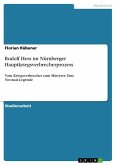At the height of the Second World War, Hitler's Deputy, Rudolf Hess, made a dramatic solo flight to the British Isles. His arrival there was sensational news - and it baffled everyone. Why had he come?
Hess claimed he had flown to Britain entirely of his own initiative and was on a personal mission of peace. But so unlikely was the success of such an appeal in Churchill's entrenched Britain that historians continue to wonder at his motives.
In this book, Peter Raina publishes, for the first time, complete texts of Hess's 'peace proposals' and a treatise he wrote in captivity outlining how he saw Nazi Germany's role in Europe. These texts throw considerable light on Hess's mission and also on how the Nazi leadership saw their programme of expansion and their relations with Britain.
Disconcertingly single-minded and an unashamed disciple of Hitler, Hess was at heart an idealist. His friend and confidant Albrecht Haushofer was an idealist of a different kind, and joined the German Resistance Movement. The frame story of this book relates how the two men moved to their tragic ends.
Hess claimed he had flown to Britain entirely of his own initiative and was on a personal mission of peace. But so unlikely was the success of such an appeal in Churchill's entrenched Britain that historians continue to wonder at his motives.
In this book, Peter Raina publishes, for the first time, complete texts of Hess's 'peace proposals' and a treatise he wrote in captivity outlining how he saw Nazi Germany's role in Europe. These texts throw considerable light on Hess's mission and also on how the Nazi leadership saw their programme of expansion and their relations with Britain.
Disconcertingly single-minded and an unashamed disciple of Hitler, Hess was at heart an idealist. His friend and confidant Albrecht Haushofer was an idealist of a different kind, and joined the German Resistance Movement. The frame story of this book relates how the two men moved to their tragic ends.
"It is really an excellent academic piece of work containing all the relevant documents and giving a superb insight into Hess's motives, his character and his complete misunderstanding of the rules, convictions and traditions of British policy. I recommend it warmly for publication." (Professor Rainer F. Schmidt, Institute of History, University of Würzburg, Germany)








